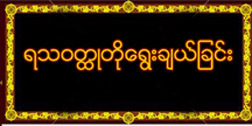Buddhist Psychotherapy
ME26 04-03-2011 (4:00 to 5:00)
(Class Notes Only)
-----------------
Buddha has spoken of the pure and true mind as being fundamental; it is the Buddhanature, that is, the seed of Buddha-hood. In like manner, if the light of Buddha’s Wisdom is concentrated upon the human mind, its true nature, which is Buddha-hood. He holds the lens of Wisdom before all human minds and their faith may be quickened.Often people disregard the affinity of their true minds for Buddha’s enlightened wisdom. “Once upon a time a man (puthujjanā) looked into the reverse side of a mirror and, seeing his face and head, he became ‘Insane’ (ummattakā). How unnecessary it is for a man to become insane merely because he carelessly looks into the reverse side of a mirror!” It is just as foolish and the unnecessary a person to go on suffering, because he does not attain Enlightenment where he expects to find it.
Thus, Buddha said: “Sabbī puthujjanā ummattakā”- ‘All Man is Insane’. But, strange enough, when people attain Enlightenment, they will realize that without false beliefs, there could be no Enlightenment. Buddhism examines its basic philosophical teachings and historical development, setting forth complex and significant ideas or intelligent in a straightforward and simple style that is easily accessible.
The Upaniṣadic theory of an eternal and immortal ‘self’ (atta) seems, therefore, to have been intended to satisfy this deep-seated craving of man for permanent happiness. But for the Buddha, who realized that everything in this world is impermanent, such a solution was not in the least satisfactory. While realizing that there is no permanent or immutable entity called the ‘self’, he also found that belief in such an entity led to further suffering. Inculcation of the virtue (sūsarīta) of selflessness on the basis of a belief in ‘self’ (ātman) was, according to the Buddha, neither satisfactory nor correct. This lead to the statement of the third characteristic, namely ‘non-substantiality’ or ‘no-self’ (anatta).
According to the Buddha “and centuries later, according to Freud (Psychoanalyst) also”, man’s behavior as well as his out-look on life are determined by several instincts such as ‘desire to live’ “Jīvitukāma”, “desire to avoid death’ “Amaritukāma”, ‘hankering for happiness’ “Sukhakāma”, and ‘aversion to pain’ “Dukkhapatikkūla”.
The Buddha theory that simply accords with one’s own inclinations (diṭṭhinijjhānakkhanti) or one that is merely consistent or plausible (bhabbarūpa) is not true in itself. These are not the criteria of truth. Truth for him was what accords with facts (yathabhuta), not that which caters to one’s likes. The Buddha was not prepared to posit an agent or a mental substance behind the psychological process represented by such things as feeling (vedanā), perception (sañña), dispositions (saṅkhārā), and consciousness (viññāṇa). ‘I think, therefore I am’ is a conclusion to be repudiated. The heretical view put forward by a monk called “Sāti” and the Buddha’s analysis and repudiation of this heresy throw much light on the question. It is said in the Mahātaṇhāsaṅkhaya sutta that a monk named Sāti held the view that according to the Buddha’s doctrine ‘it is this consciousness which transmigrates and not an-other’.
Apart from such physical causes of Karma, there are certain motives that determine the behavior of man. Conscious motives are those such as greed or attachment (rāga or lobha), hate or aversion (dosa), and confusion (moha). A synonym of lobha (mūla) and tanhā is Abhijjhā 'covetousness', it is the eight link of the unwholesome courses of action (kamma-patha).
A synonym of dosa (mūla) is Vyāpāda ‘ill-will,’ it is one of the five hindrances (nīvarana) and one of the ten fetters (samyojana). Generally it is evil behavior that is produced by these motives, while morally good behavior is motivated by the absence of greed (alobha), the absence of hate (adosa) and the absence of confusion (amoha). In these cases, of course the responsibility of the individual is undeniable. This is the reason why the Buddha emphasized the psychological aspect of behavior and equated Karma with volition (cetanā).
Unconscious motives are also influence behavior. Among the unconscious motives are the desire to perpetuate life “jīvitukāma” and the desire to avoid death “amaritukāma”, both of which relate to what “Freud” called the “life instinct”; and the desire for pleasure “sukhakāma” and aversion to pain “dukkhapaṭikkūla”, both of which compare with the Freudian “pleasure principle”. These motives, though unconscious, result from mistaken understanding of the nature of human existence. Hence an individual may be held responsible for behavior determined by them. The living organism is called nāmarūpa or the psychophysical personality. It becomes only when influenced by a surviving consciousness (vinnññāṇa). The psychophysical personality (nāmarūpa) would not be constituted therein.
This being the case, from birth still death, and still we did not know it, we would study to correctly know it is only the citta, cetasika and rupa which are not us, and study in further detail, since the pañña of this level cannot eradicate kilesa or rāga. The dhamma that the Buddha had manifested from his enlightenment shows his supreme pañña (wisdom), karūna (compassion) and pārisudhi (pure). Pañña would only know the names, that there are two realities. But the actual realities that are performing their functions namely the reality that is nāma-dhamma that is seeing, hearing, thinking, feeling happy or unhappy, like or unlike etc.
'There, after the bhikkhu would attain peacefulness within…' this is the satī-patthāna arising. This is a person progressing by respective levels, from the sotapanna to being the sakadāgāmī to attain level of anāgāmī, '…and the realization of the dhamma with supreme pañña. Then he should be steadfast in those very wholesome sermon (kūsala dhamma), and persevere ever more towards the eradication of the āsava.' which is to attain arahantship.
by Ashin Indaka(Kyone Pyaw)























0 comments:
Post a Comment